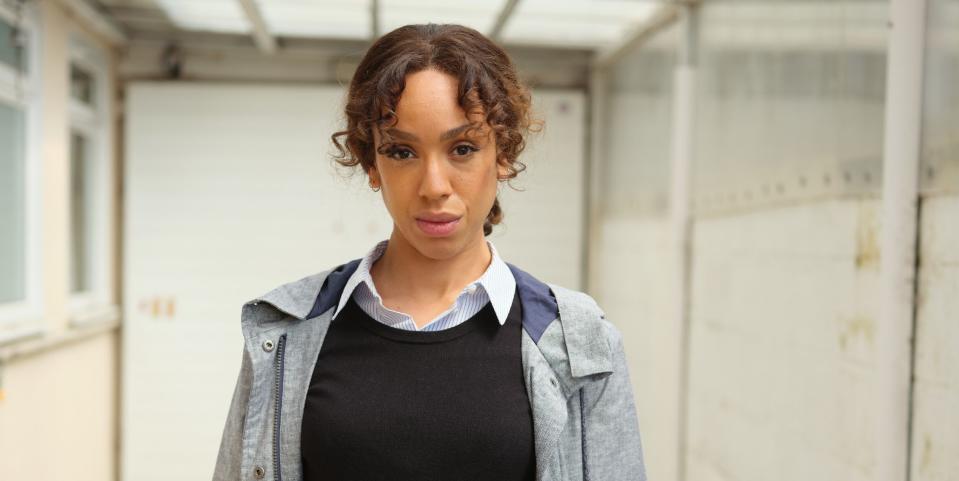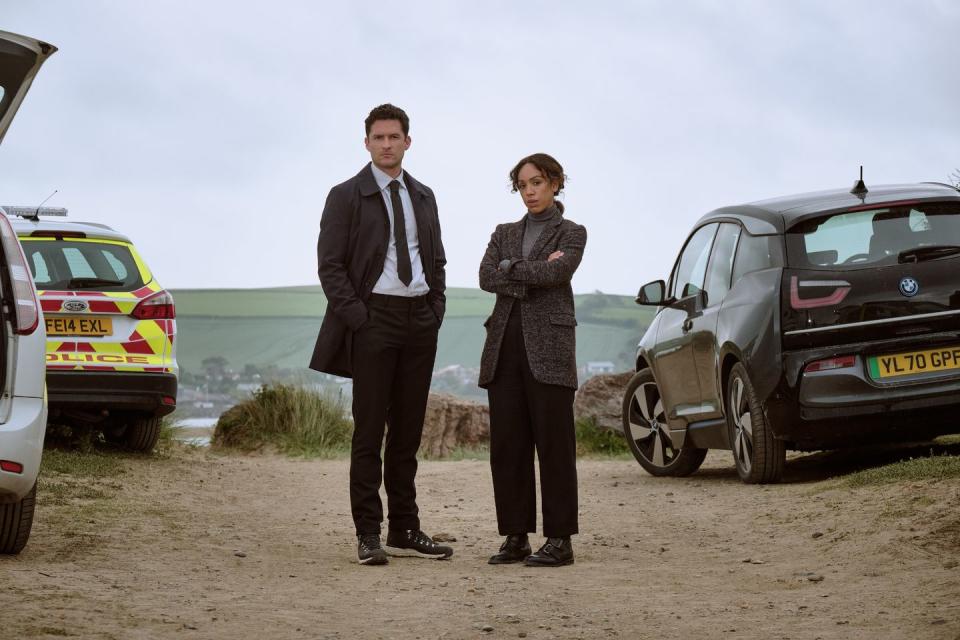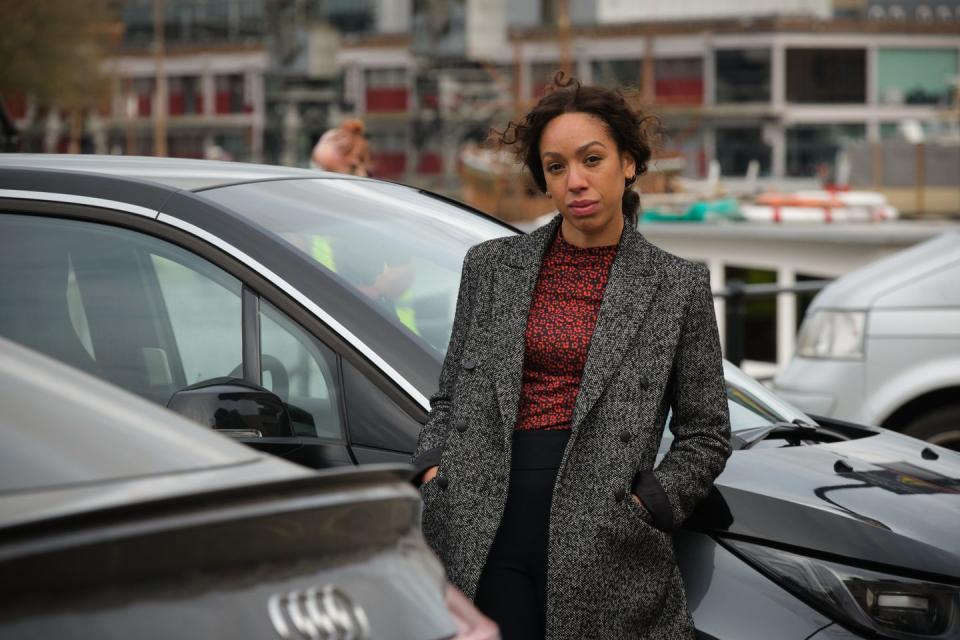Pearl Mackie on The Long Call, Doctor Who, and bisexual stereotypes

Rainbow Crew is an ongoing interview series that celebrates the best LGBTQ+ representation on screen. Each instalment showcases talent working on both sides of the camera, including queer creatives and allies to the community.
Next up, we're speaking to Pearl Mackie about The Long Call and Doctor Who.
It would be easy to assume that The Long Call is just another ITV murder mystery in a long line of ITV murder mysteries. But as anyone who's watched the show can already attest, the latest Ann Cleves adaptation is also so much more that.
Sure, The Long Call investigates murder in a sleepy coastal town, not too dissimilar from Broadchurch and other shows of its ilk, but crucially, this story is an intrinsically queer one. From Ben Aldridge's involvement as a gay lead detective to the work of director Lee Haven Jones on set, The Long Call is queer on both sides of the camera.
That shouldn't be revolutionary anymore, but it still is, particularly when it comes to British TV. But Pearl Mackie is no stranger to genre shows that feel a bit queerer than most. Years before she took the role of DC Jen Rafferty in The Long Call, Pearl made history when she was cast as Bill Potts, the first gay companion in Doctor Who.
Following that arc and her own coming out journey as bisexual in 2020, it should come as no surprise that a project like The Long Call would resonate with Pearl. "It just felt really, really wonderful to be on a set, and feel comfortable talking about a queer person, and our experiences, sharing all that."

We caught up with Pearl to discuss DC Jen Rafferty's journey, Doctor Who's impact, and dismantling bisexual stereotypes on British primetime TV.
The Long Call is different to your typical coastal murder mystery in a lot of ways, but for you personally, what sets this show apart from others in the genre?
Firstly, having a gay male lead is something I’ve never seen in a detective drama, especially not an ITV primetime detective drama. So for me, to have a queer person in the lead, that was hugely important and really amazing. And I think also the way the character is portrayed, he’s presented in a very loving, secure marriage.
I really liked that he wasn’t questioning himself as a gay man. He’s looking at his mum, and looking at the rest of the community beside him. But he is secure within his relationship, which I really love.
And I guess in those terms, a lot of other characters, like Jen, for example, they feel really human. She’s very nuanced and real and complicated. You learn a lot about their personal lives as a whole, really. And I think that in itself is really great. It’s character-based, and it focuses on their humanity, as well as them as detectives.
What does it mean to you to be part of a British show that’s made such an important step forward for queer representation on TV?
It’s a huge deal. It’s one of the things that drew me to the project in the first place. It feels like it is breaking new ground. I can’t think of an example where it’s been done before.
Being a member of the queer community myself, and working with Ben, who’s also gay, and Lee Haven Jones, the director, who’s also gay — It was just a wonderful set to be a part of. We all had some amazing conversations, delving into Matthew’s own past trauma and life and relationship. But then we’re exploring the nuances of our own relationships, and our own kind of history as well.

There's this really interesting subplot where Jen has to contend with gender politics at work, and in particular, some outright misogyny from a fellow officer. Can you talk me through that storyline more and your thoughts on how the show handled this?
I don’t think it’s something that’s particularly shocking for many women, especially women working in very male-dominated environments.
I really enjoyed that in the show… Matthew was immediately like, "I’m your superior officer, and I’m not having that." It leaves you with no questions. It’s not even because he and Jen were that close at the time. He’s just like, "That is not OK. That is not how we speak to people."
Then Jen stands up for herself later on, and is like, "This is absolutely not OK." And I really like that about it as well. I think she’s got a lot of gumption.
Was there a particular scene or storyline that really resonated with you in particular?
I don’t know if there’s a huge amount within Jen’s character that is similar to my own life and experiences. Which is probably quite a good thing. But I think I really connected to her desire to protect people.
She’s really been through the mill, and knows what it’s like to be manipulated and abused, emotionally and physically. I think she just really wants an outlet to protect women – and, indeed, anyone else that might be preyed upon by people who are abusing their power.
I think that’s a really important story to be telling. So much of women’s rights and safety are being debated at the moment in the media. Some of it’s just absolutely insane, the reaction that people are having in terms of… We won’t get into that, otherwise I’ll be here for a long time! But I think that’s a really important story to be telling in terms of consent and the kind of blurred lines around that. We just need to be like, "Yeah, it’s actually quite simple."
Was there anything you found particularly challenging about taking on the role?
It probably sounds quite simple but just the whole idea of having teenage children was something that was quite alien to me, because I don’t have any children. It’s quite a jump, to put myself in this mind-set.

We worked quite closely together to figure out an exact story, and chart Jen’s life until now. It really helped me get into her headspace. But this was quite new to me, relating to teenagers in a parental way. I just really wanted to make it authentic. They were lovely and very funny and very fun to work with. So I had a really good time.
Would you be open to returning for a second season of The Long Call?
I wouldn’t not be open to a second series. I think it was great, and, like I said, I had such an amazing time shooting it. I think there is definitely more room for exploration within that police station. I’m sure there’s many more crimes to solve down there. So yeah, I wouldn’t say no.
Thinking more generally now, how do you feel about the way that queer, and bisexual characters in particular, are portrayed on screen? Bisexuality is still not represented in the same way as some other aspects of queerness.
No, it really isn’t. I would completely agree with that. If it’s portrayed at all, it can be portrayed in a very marginalised way. Either it’s a sort of stopover, or it’s someone exploring. They don’t really know what they’re actually doing, and they’re either straight or gay, which kind of negates bisexuality as a sexuality in itself.
Or it’s just portrayed as greedy, and they’d probably sleep with anyone, so they're likely to cheat on your partner, and all of that – all things that are a completely one-sided, narrow-minded view of sexuality.
I don’t think enough stories are written about bi people by bi people, who are like, "It’s just my reality." Just because I am attracted to all genders, it’s not like it’s going to quadruple my chances of cheating on my partner. That’s not how it works at all. It’s like: no, I’m over that. I think it’s time to change that narrative.
Does this ever impact the way you approach certain roles or the kind of stories that you seek out?
With The Long Call, I was like, "Oh, this is really interesting. It’s got a queer character as the lead." I was like, "That excites me. That’s great." But obviously, Jen’s not a queer character, and I really love playing her..
To me, mostly, it’s about if they capture the humanity of the character, to be honest, and what they’re like. If they’re portrayed in a truthful, nuanced, in-depth way; if they’re three-dimensional; if they come to life when you read them on the page; and you feel like you could add more to that; when you feel like you know that there’s stuff under the surface that they’re not saying – that’s what I enjoy. That’s exciting. There’s some stuff going on underneath there that we can draw out, and play around with, and explore.
Obviously I’d love to play some more queer characters, but, yeah, like I say, it’s about the story, and the humanity of the characters.
You first became famous for playing Bill Potts, the first gay companion on Doctor Who. When you look back at that role and its impact, what are you most proud of?
That’s a good question. What am I proud of? I mean, I’m really proud of the way we had a queer Black woman, and I think the relationship that a lot of the fans had with her, and a lot of the LGBTQ+ fandom had with her, is amazing, really.
I didn’t ever really anticipate that I would, myself, as an actor, ever be part of anyone’s journey or coming-out story, or be able to help someone feel more comfortable with who they are. And for me, that’s a phenomenal thing. Even thinking about it too much is quite overwhelming – in an amazing way, but also in a kind of mind-blowing way.
But, yeah, for me, that would definitely be the thing I’m most proud of about the fact I got onto Doctor Who.
Looking ahead, we wanted to ask you about a new series you're currently filming called Tom Jones. It won't be out for a while, but what can you tease about your role in it?
It’s a reimagining of Tom Jones, which puts a mixed-race woman as the love interest. I play her maid servant, Honour. I think it’s a really nice way of modernising the story in a way that explores the truth of what it would be to have a mixed-race woman in that world, in that time.
We’re halfway through shooting it at the moment in Belfast. It’s really fun for a period costume. So, yeah, it should be really good.
The Long Call is available on ITV Hub.
Organisations including The Mankind Initiative (www.mankind.org.uk) provide support and advice to male victims and survivors of domestic abuse, domestic violence and coercive control. Its confidential helpline, open weekdays between 10am and 4pm, is 01823 334244.
You Might Also Like

 Yahoo News
Yahoo News 